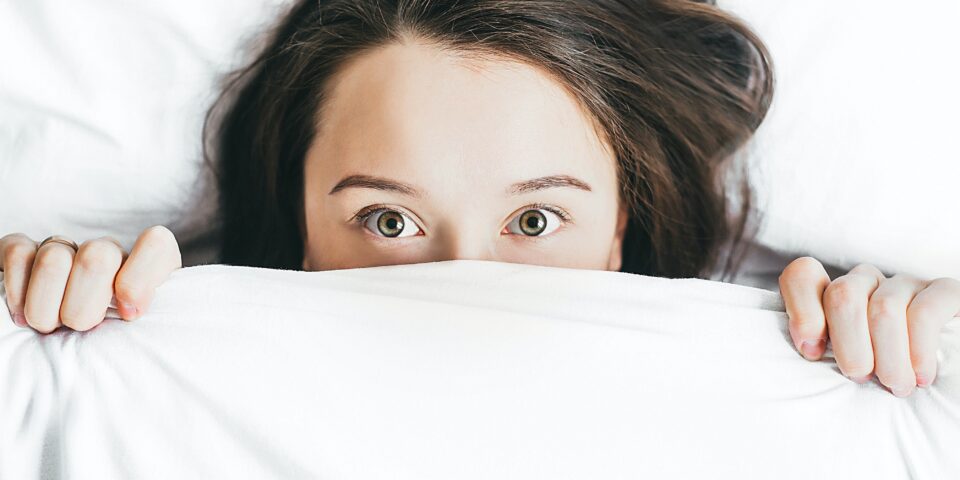Sleep apnea—the condition where you stop breathing while asleep—can be caused by snoring, obesity, and other issues. But you don’t have to be overweight to develop this disorder. There are a number of sleep apnea symptoms to look out for, including loud snoring, choking or gasping during sleep, excessive daytime sleepiness, and a lack of awareness that you are sleeping.

In fact, some people may not notice they have a sleeping disorder at all until their family members wake them up in the middle of the night. This means you could be suffering from sleep apnea without knowing it! The good news is that there are several treatments you can try, including surgery, weight loss, and dental appliances.
Sleep Apnea – What It Is?
Sleep apnea occurs when your airway collapses while you’re sleeping and your breathing stops. It usually happens when your tongue falls back into your throat. The airway closes, causing the blood oxygen level to drop, leading to low energy levels, morning headaches, and snoring.
Some people have no symptoms at all. Most people with sleep apnea experience some of these symptoms.
How Do You Know If You Have Sleep Apnea Symptoms?
Sleep Apnea is characterized by a long, loud snoring sound or choking gasps while asleep. Sometimes it occurs during the day or night. It is caused when your airway closes briefly (hypopnea) or completely (apnea) during sleep.
When this happens, you can’t breathe properly. Your heart has to work harder to keep you alive and can cause excessive daytime drowsiness, fatigue, and insomnia.
The most common symptoms include loud snoring, trouble breathing, and waking up gasping for air. Other symptoms include frequent headaches, memory problems, depression, and anxiety. Sleep apnea should be evaluated by a doctor who can test your airway. A sleep study may also be necessary to diagnose sleep apnea.
What Are the Causes of Sleep Apnea?
Sleep apnea occurs when the muscles that support the upper jaw don’t contract properly while sleeping. As a result, the lower jaw drops, and the airway collapses, preventing normal airflow. The person may experience snoring, pauses in breathing while asleep, gasping, or waking up briefly during the night and finding it difficult to resume sleep.
Snoring is often associated with mild obstructive sleep apnea, a condition that makes people more vulnerable to heart disease and diabetes.
The most common type is, obstructive sleep apnea, occurs when the airway becomes partially blocked, causing air to leak into the throat and interrupt breathing. People who have this condition usually fall asleep easily but may experience repeated choking.
People suffering from sleep apnea experience periods of frequent arousals from a deep sleep that may last seconds or even minutes at a time. These arousals interrupt the normal restorative sleep cycle and can cause daytime drowsiness, irritability, depression, and fatigue.
This is called the “second half of sleep” and contributes significantly to sleep deprivation and the early onset of diseases like diabetes, high blood pressure, heart disease, and depression. Sleep apnea can affect both children and adults.
Is There Any Treatment for Sleep Apnea?
Sleep apnea treatment is typically a combination of lifestyle changes and medication. But while there are many options to treat the condition, the majority of patients have to deal with mild sleep apnea which often goes undiagnosed and untreated. However, if untreated, it can be very dangerous and even life-threatening.
Oral medications used to treat obstructive sleep apnea include waklert 50, artvigil 150 mg, the nasal decongestant xylitol, which relaxes nasal muscles and improves airflow; and anticholinergics, which help relax muscles that open up the throat.
But they don’t prevent the leading cause, which is enlarged tissue in the back of the throat blocking air passage into the lungs. There is no cure for this condition. However, there are treatments available to help control the symptoms.
Which Remedies Can Help in The Treatment of Sleep Apnea?
There are a lot of things you can do to improve your quality of sleep and relieve some of the symptoms of sleep apnea. Most people don’t even realize they have sleep apnea, but once they are aware that they’re suffering from sleep apnea, there are several home remedies that can help them get better rest.
Some of the most common treatments for sleep apnea cure are breathing exercises, relaxation techniques, and eating healthier foods. Many people get relief just by cutting back on albea deutschland sugary drinks. Others find that cutting back on caffeine and nicotine and drinking more water helps.
In conclusion,
you can use the following treatment options for sleep apnea depending on the severity of the problem. First and foremost, if you have moderate to severe sleep apnea, you need to stop smoking, lose weight, and stop snoring. Your doctor may also prescribe CPAP sleep apnea therapy, which uses a mask worn over the nose and throat to force air into the back of the throat and keep it open during sleep, preventing a collapse of the upper airway. The wearable CPAP machine may be worn during the night or continuously throughout the day.
The goal is to prevent you from waking up gasping for air. If you have mild sleep apnea, you can use breathing devices that you wear at night. Some people have a small, implanted device in their nose to open the airway while they sleep.
Other people who have mild sleep apnea may be able to treat themselves with a continuous positive airway pressure machine, which provides gentle, steady pressure to the airway and improves airflow without completely



